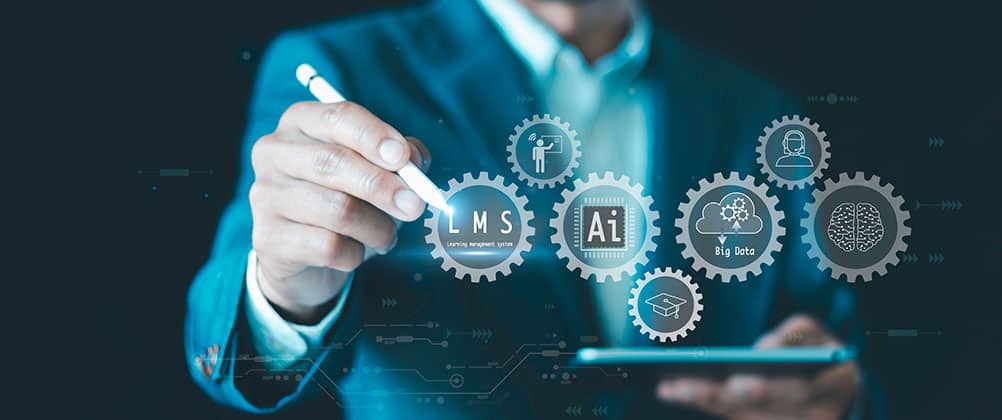
In today’s highly competitive business world, managers recognize the essentials of employee training and how it contributes to a productive and successful work environment. However, many companies still depend on outdated learning platforms. This may decrease the efficacy of the workplace and employees’ skills. Also, training an entire workforce on a legacy platform is cumbersome and restricts the ability to track training performances. According to Fortune Business Insights, the global market for AI LMS systems was US$23.35 billion in 2024. It may increase up to US$32 billion by 2032, with a CAGR of 17% during the forecast period. Indeed, LMS AI technology can improve technical capabilities and interactive methods.
How AI is Shaping the Future of Learning in the Workplace
Of course, AI is transforming how we approach learning and development in workplaces. By leveraging the power of machine learning, AI can personalize training experiences. It can also ensure employees get relevant content seamlessly, according to their unique needs and learning styles.
This customization and personalization boosts skill acquisition and enhances engagement. AI also enables real-time tracking and analytics. It helps HR and corporate managers gain insights into employee performance and progress. This data-driven approach makes learning more effective and aligned.
Nearly 55% of organizations have adopted AI to varying degrees. This data shows the rapid increase in automation for many businesses in the near future.
AI Learning Management Systems can automatically recommend relevant content to users, keeping training effective and up-to-date. Employees can access on-demand learning materials, making it easier to upskill employees anytime, anywhere. As AI LMS grows, it will further empower employees to develop new competencies.
This makes businesses more competitive and agile in an ever-evolving market. By embracing AI, companies can create a continuous learning culture to revamp the future of the workplace.
Benefits of AI LMS for Continuous Learning in the Workplace
Personalized Learning
LMS AI uses data from the feedback and learners’ preferences to recognize patterns and enhance personalized learning with relevant course recommendations.
Benefits for Learners: Personalized learning plans increase learners’ involvement, which in turn helps them gain more insights and sharpens their skills without much hassle.
Benefits for Trainers: AI LMS enables effortless content generation and content recommendation and eases trainers’ jobs, allowing them to focus on more core learning and development activities.
AI Course Creation
AI helps companies create more impactful and personalized courses, empowering them to improve skill sets. AI simplifies course creation by generating content based on specified topics, training needs, audience categories, and more. The flexibility and ease of generating content help organizations to scale their training programs while maintaining personalization and effectiveness.
Driving Engagement
AI Learning Management Platforms increase employee engagement by providing personalized learning experiences. The platform tracks learners’ journeys, content preferences, and skill gaps to recommend relevant courses, making the training more interactive and relevant. Modern LMSs like Skill Lake feature easy performance tracking, which, when combined with AI course recommendation features, powers a streamlined and productive learning journey.
Read More: How Can LMS Integrations Maximize Your Learning Outcomes
Continuous Learning
According to an IBM survey, 40% of organizations are considering AI, whereas 42% of businesses have already integrated AI into their operations. With rapid growth, changes in continuous learning become essential for success. AI LMS delivers a culture of continuous learning through easy course generation and course recommendation abilities. It offers employees access to relevant learning materials at any time.
With personalized learning paths, employees can progress at their own pace. The AI system adapts as they advance, suggesting new content based on their growth. This approach ensures employees are always learning and improving.
It enables them to stay current with industry trends and develop new skills. AI-based LMSs like Skill Lake support ongoing professional development, keeping employees competitive and agile.
Maximizing Knowledge Retention
AI-powered LMS tracks a learner’s journey and identifies courses or content materials to enhance each user’s learning experience. It helps reinforce learning, enabling an active and motivated learning journey. Learning becomes more personalized and engaging when AI Learning Management Systems features combine with modern LMS systems that offer innovative learning modes.
Imagine the convenience when learners can opt for self-paced learning or instructor-led learning modes based on their learning preferences. Flexible learning options like synchronous and asynchronous learning boost the knowledge retention rate, making every training experience effective and profitable.
Conclusion
AI-powered Learning Management Systems (LMS) like Skill Lake have become more useful in corporate training. Transitioning from legacy LMS to AI Learning Management Platforms provides several benefits, like enhanced engagement, accessibility, personalization, etc. All these advantages enhance workplace efficiency and make employees more productive. By integrating AI Learning Management Systems into the workplace, businesses can make their workforce more innovative. Here’s a quick rundown of how Skill Lake AI LMS can boost learning experiences for your organization:
- AI/ML Powered Course Recommendations
- AI Course Creator
- Courses with Immersive AR/VR Experiences
- Multiple Learning Modes
- Learning Mobile App
- Easy Tracking & Reporting
- Interactive Feed
- Gamification
- Competency Management & Mapping
- Integration with Learning Content Platforms
However, when choosing the best AI-powered LMS, it’s essential to identify needs and business goals. This will help you choose the most suitable AI LMS for your business and positively impact the learning experience. Also, consider factors like security, implementation, user interface, integration, and support.
Skill Lake Modern LMS guarantees ease of use, data security, and seamless integration. Why not request a Free Demo today and see for yourself?


Aarathy Jayakrishnan
Aarathy is an e-learning professional and enthusiast with a keen understanding of learning and development concepts. She writes insightful content, unraveling the possibilities that e-learning holds, and strives to make education open for all.